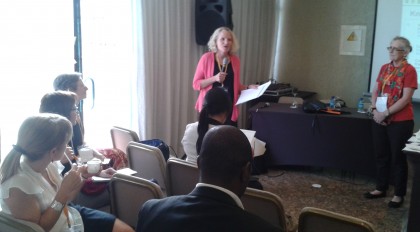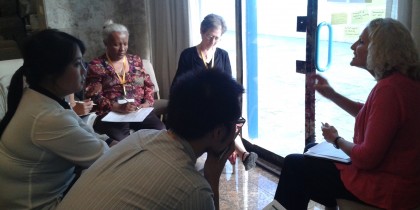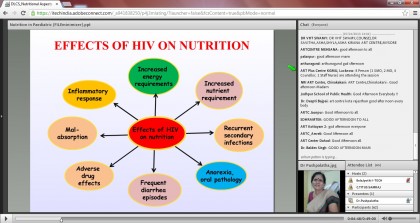More effective, efficient and sustainable health worker in-service training (IST): what have we learned so far? The IST session in a nutshell from the 3rd Global Forum on Human Resources for Health, Recife, Brazil.
 There are more in-service training programs than ever before with training often representing the lion’s share of investments for strengthening human resources for health (HRH). An increasing number of reports indicate that training is rarely evaluated, frequently duplicative and may not be designed to meet needs. A growing multiplicity of poorly coordinated training providers may overwhelm and weaken training systems rather than strengthen them.
There are more in-service training programs than ever before with training often representing the lion’s share of investments for strengthening human resources for health (HRH). An increasing number of reports indicate that training is rarely evaluated, frequently duplicative and may not be designed to meet needs. A growing multiplicity of poorly coordinated training providers may overwhelm and weaken training systems rather than strengthen them.
Ensuring that quality of the services delivered by health workers is upheld and continually strengthened is of utmost importance to the Universal Health Coverage agenda. Training is clearly an important contribution towards the development and maintenance of health worker competencies for delivering quality services – but how can we make training more effective, efficient and sustainable? While evidence is patchy, we have substantial experience and expertise on what practices are essential – such as the practice recommendations summarized in the USAID PEPFAR-supported Improvement Framework for Health Worker Improvement Framework for Health Worker In-service Training, which we launched at the November 13th IST side session of the 3rd Global Forum on HRH.
We gathered participants from around the world at this side session to harvest and share experiences, strategies and lessons learned. Sparked by info-rich and stimulating lightning talks that compressed research, evidence-informed frameworks and country experiences into 3 minutes – participants speed networked and brainstormed their way through each theme of the Improvement Framework in a knowledge café.
 So what did we learn? We’ve conveniently packaged together the questions we discussed along with some of the main lessons learned here:
So what did we learn? We’ve conveniently packaged together the questions we discussed along with some of the main lessons learned here:
1) Strengthening training institutions and systems: how can we strengthen, standardize and institutionalize training systems?
- In-country linkages between learning systems (pre-service education, CPD) are needed to strengthen and institutionalize training systems. IST should also be provided by local institutions to increase ownership and sustainability of training. Standardization of training materials and program can maximize existing resources for training for training and improve training effectiveness and efficiency. Resource flows require further analysis and improvement with participants recommending that advocacy is needed for training budgets within healthcare systems to support trainees to attend IST programs.
2) Coordination of training: what mechanisms can be used to better coordinate training? What characteristics are most desirable in a training information/tracking system?
- We need to stop training the same people over and over again, while others are not trained at all. A system for tracking training courses and participants would not only improve the efficiency, effectiveness and sustainability of training, it would also help to ensure equitable access to training by all health workers.
3) Continuum of learning from pre-service to in-service: What roles can different stakeholders play to ensure continuum of learning between pre-service education and in-service training?
- Pre-service institutions can be at the heart of a coordinated in-service training structure by offering courses directly or accrediting groups like professional associations to provide training. This model can help ensure consistency between pre-service and in-service training content and allow for in-service trainings to count towards degree programs offered by pre-service institutions. This approach requires coordination among key stakeholders such as academicians, associations, regulatory council, and ministry of health.
4) Design and delivery of training: A review of the literature suggests shorter, repeated, simulation-heavy, workplace-based training can be more effective. Given the current system is geared towards classroom-based, group-based training, how can we implement more effective methodologies?
- We should prioritize linking any training event to continued health professional development, and look for opportunities to provide workplace-based training using alternative methodologies that supports a continuous quality assurance process.
5) Support for learning: How do we prepare, support and incentivize busy healthcare workers to provide workplace-based mentoring or support to others?
- It’s interesting to note that during the knowledge café this question did not generate any discussion – perhaps because addressing support for learning extends well beyond training and education systems, into issues of supervision, job descriptions, working conditions, and other aspects of human resource and facility management. Nevertheless, all agreed that ensuring an on-the-job environment the enables the learner to utilize new knowledge and skills is essential to translating learning into improved quality of services and health outcomes.
6) Evaluation and improvement of training: How can evaluation of IST outcomes be strengthened to inform improvement in training? What are some of your successes and some of your needs in identifying results of your training programs?
- The evaluation-focused group was well-attended, and participants engaged eagerly in identifying themes for discussion around the topic of outcome-level evaluation of trainings. One of the key issues discussed was that there are multiple factors – barriers and facilitators – influencing the outcomes of training programs, which poses a significant challenge to evaluation. It was noted that teasing out these factors methodologically, to identify the specific contribution of training towards desired program outcomes, requires significant time, thought, and resources. Participants in this group were provided CDs containing the Training Evaluation Framework and Tools (TEFT) and a web link (www.go2itech.ort/resources/TEFT) providing resources to help address this challenge.
There’s clearly more than we were able to harvest and digest in a 90 minute session. We’d like to invite you to join us in sharing your experiences online via the open access wiki we are putting together; this is expected to launch in February 2014. This wiki will include one page guidance for each recommendation in the Framework including a brief synthesis of the relevant literature, examples of good practice and links to additional resources and tools. We invite you to enrich this wiki with your examples, lessons learnt and technical resources and join the growing community who are leading change efforts towards more effective, efficient and sustainable training.
Itching to get started? Click on the links below to have your say and see what others are saying:
- How can we strengthen, standardize and institutionalize training systems?
- What mechanisms can be used to better coordinate training? What characteristics are most desirable in a training information/tracking system?
- What roles can different stakeholders play to ensure continuum of learning between pre-service education and in-service training?
- Given the current system is geared towards classroom-based, group-based training, how can we implement more effective methodologies?
- How do we prepare, support and incentivize busy healthcare workers to provide workplace-based mentoring or support to others?
- How can evaluation of IST outcomes be strengthened to inform improvement in training? What are some of your successes and some of your needs in identifying results of your training programs?
For more information:
A Global Improvement Framework for Health Worker In-service Training: Guidance for Improved Effectiveness, Efficiency and Sustainability: http://ow.ly/qZAVu
Human Resources for Health Journal Series on Improving the efficiency, effectiveness and sustainability of health worker in-service training: Closing the gaps between evidence, practice and outcomes: http://www.human-resources-health.com/series/IST
Training Evaluation Framework and Tools: https://www.go2itech.org/resources/TEFT
Authors: R Bailey, CapacityPlus; J Bluestone, Jhpiego; G O’Malley, I-TECH; C McCarthy, CDC; S Ngobua, CapacityPlus; F Petracca, I-TECH; L Schaefer, USAID; T Wuliji, USAID Applying Sciences to Strengthen and Improve Systems Project (ASSIST),

 There are more in-service training programs than ever before with training often representing the lion’s share of investments for strengthening human resources for health (HRH). An increasing number of reports indicate that training is rarely evaluated, frequently duplicative and may not be designed to meet needs. A growing multiplicity of poorly coordinated training providers may overwhelm and weaken training systems rather than strengthen them.
There are more in-service training programs than ever before with training often representing the lion’s share of investments for strengthening human resources for health (HRH). An increasing number of reports indicate that training is rarely evaluated, frequently duplicative and may not be designed to meet needs. A growing multiplicity of poorly coordinated training providers may overwhelm and weaken training systems rather than strengthen them. So what did we learn? We’ve conveniently packaged together the questions we discussed along with some of the main lessons learned here:
So what did we learn? We’ve conveniently packaged together the questions we discussed along with some of the main lessons learned here: n on National ART Guidelines in 2012.
n on National ART Guidelines in 2012.